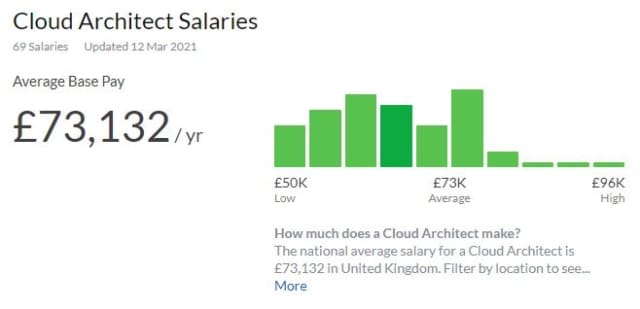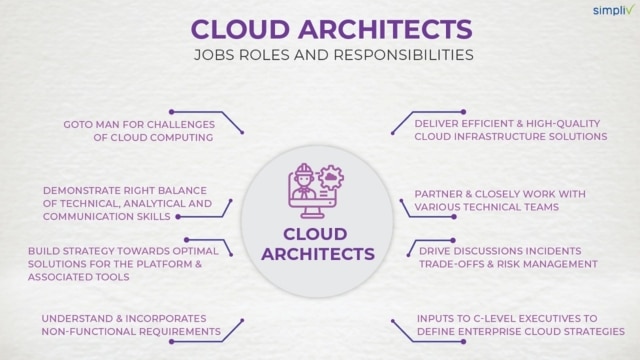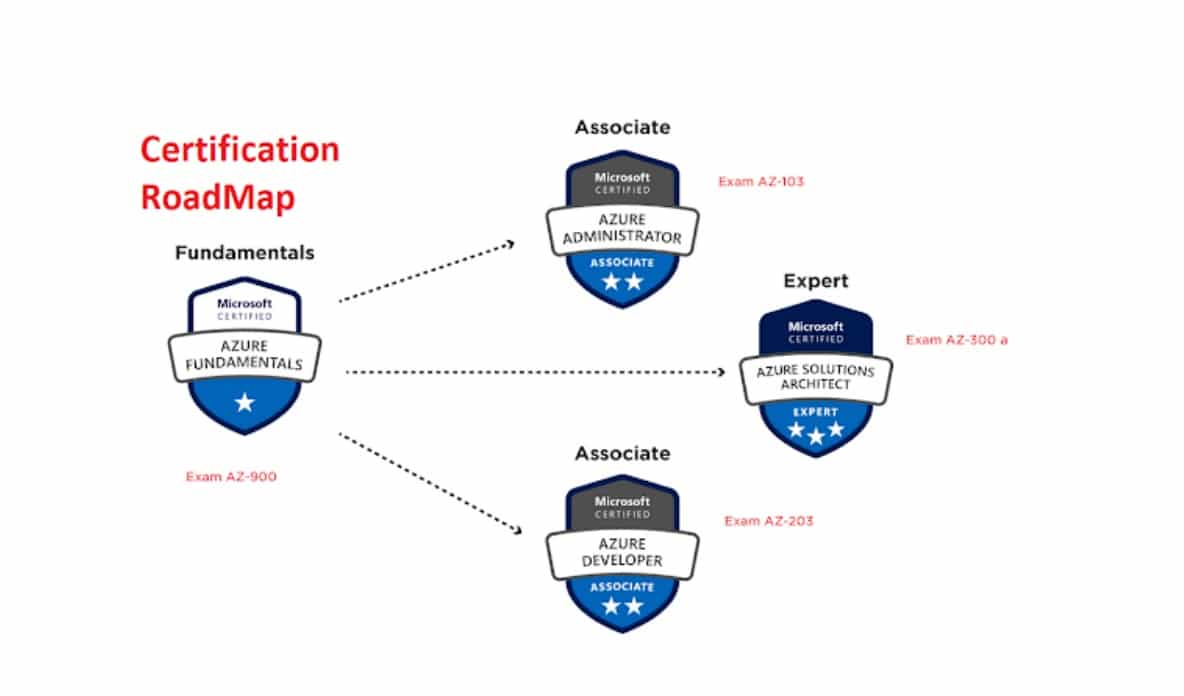As cloud adoption increases and strategies become more complex, cloud architects are increasingly in demand. They’re required to help organisations mitigate risk and ensure a seamless migration to (and management of) all architecture in the cloud.
Following the growth in hybrid cloud computing, companies are realising they need to have at least one accountable architectural leader to steer them through this transformation. That’s why the role of the cloud architect is one that many organisations are seeing as mandatory.
According to a recent survey, the top two most in-demand IT operations roles right now are cloud systems engineers and cloud architects.
What is a cloud architect?
Cloud computing architecture refers to all the components required for the cloud environment, whether that’s a public cloud or private cloud. These generally include a front end platform, a back end platform, a type of cloud-based delivery system, a cloud provider, and a network. When combined, these elements make up the cloud architecture.

n a world of digital transformation, a cloud architect, or cloud infrastructure engineer, is responsible for deploying the technical requirements of a project into the architecture and design in order to achieve the desired end product. Cloud architects are also usually responsible for bridging gaps between complex business problems and their solutions in the cloud.
Cloud architects oversee an organisation’s cloud computing strategy through deployment, management, and support for cloud apps. Architects usually report to an IT director and work alongside DevOps engineers and developers as well as other members of the tech team to ensure the right technologies are being built. They may have to build relationships with customers and work closely with colleagues.
The types of industries with cloud architect jobs can be anything from technology and manufacturing firms to video game developers, design companies, and healthcare providers – or any other businesses that use cloud technology.
Key skills needed
Most cloud architects already have a background in cloud computing or a similar area and have a good working knowledge of:
- At least one operating system: e.g. Linux, Unix, Solaris, Windows, or Ubuntu. Prior experience as an administrator or architect in any of these systems is helpful. It’s also essential that cloud architects are familiar with the advantages and disadvantages of using each operating system.
- Networking: These include TCP/IP, HTTP, DNS, IT addresses, etc. Some familiarity with these concepts is essential before embarking on a career as a cloud architect.
- Computer programming languages: At least a minimal knowledge of programming or scripting language is required. Over the last few years, languages like Perl, Python, and Ruby have become prominent in the cloud. Java and .NET remain popular.

- Data storage: A cloud architect needs to understand how and when to use data centres. In AWS for example there are various storage options and architects need to know which to use. This involves having an understanding of hardware, storage buckets, and infrastructure.
- Security: Security in a cloud environment is essential. Therefore, cloud architects need to understand key security concepts. Working knowledge of concepts like firewalls and their functionality is a pre-requisite for the job.
- Strong knowledge of cloud provider services: including Amazon AWS, Google, or Azure. When it comes to getting hired, having an AWS Certified Solutions Architect Associate, Google Certified Professional Cloud Architect, or Azure Solutions Architect Expert certification will help you get ahead of the crowd.
- Experience in ITSM, I&O, automation, vendor management, and governance.
While the above list isn’t by any means exhaustive, having a strong technical background is crucial to becoming a cloud architect. But as well as strong technical skills, a cloud architect should have good ‘soft’ skills and be able to communicate and collaborate well with others.
A cloud architect needs to know, for example, how and when to delegate, possess leadership skills, and be able to drive change within an organisation. Other helpful skills include knowledge of finance and legal experience.
Cloud architect salary and career progression
One of the most FAQs is how much do cloud architects earn? According to Glassdoor, the average salary for a cloud architect is £70,257 per annum.

Salaries range from around £52k to £95k depending on experience, location, and skills. Cloud architects in London earn the most, with other cities like Birmingham having lower average salaries. It’s a specialisation that’s likely to remain in high demand for the foreseeable future as businesses realise they need expert help to optimise their use of cloud technology.
It’s also worth pointing out that there is a high level of overlap in the requirements for lots of top IT jobs so a cloud architect career can also help to open up other opportunities, like application architecture careers.
Most aspiring cloud enterprise architects find themselves working for at least one of the major platforms in their early careers.
Architects with AWS certification have a lot of opportunities open to them. AWS is one of the biggest companies delivering cloud services, with clients including General Electric, IBM, and more.
An AWS certified cloud architect could find themselves working with a medical company requiring architects to compute and build solutions for them, for instance, to map genomes and predict diseases. Travel companies like Expedia use AWS cloud architects to host their travel suggestion service. Another big AWS client, Netflix, needs AWS architects to help them deliver fault-tolerant content to their customers.

The huge scale of these companies’ business volumes and often variable usage patterns of their customers dictate a need for hundreds if not thousands of AWS cloud architects to enable them to scale rapidly. Server and storage deployment is a must, too.
Another big and growing cloud provider is Microsoft Azure, which builds, tests, and deploys applications and services via Microsoft-managed data centres. Some big users of Azure include Apple iCloud, Adobe, eBay, Xerox, and many more. Being Azure qualified will boost the chances of a candidate getting hired for an Azure Cloud Architect position.
As well as AWS and Microsoft Azure, there are other more specialised platforms, including IBM Cloud, Kubernetes, Hadoop, and Salesforce.
Once established, cloud architects need to keep up to date with ongoing training because cloud technology changes at a rapid pace. The role of a cloud architect is a high-level job type, and some cloud architects make a career move into enterprise cloud architect jobs at bigger companies, becoming CIOs or CTOs. Alternatively, they may decide to found their own companies using their high-level business and technical knowledge.
The responsibilities of a cloud architect
A cloud architect has three main high-level responsibilities:
1. To lead the charge for cloud adoption
According to Gartner,
“the cloud architect is paramount to the eventual success of cloud adoption”.
Cloud architects need to be strong leaders that can make executive decisions and oversee the process of cloud adoption. They must take ownership of cloud computing and big data initiatives in an organisation and evangelise and direct cloud initiatives on multiple fronts. Successful organisations need to have a ‘cloud first’ mentality and this requires buy-in from leaders and stakeholders.
It’s the job of the cloud solutions architect to influence and inspire a new culture within an organisation around the adoption and consumption of cloud services.
2. To develop and coordinate cloud architecture
A second big priority for cloud architects is to develop and coordinate architecture across many areas of an organisation from application development to user experience. They need to ensure coordination of the changes to architecture in all areas. The cloud architect may not be the instigator of all changes but they need to oversee each functional architect influence them to make the right changes.
3. To develop a cloud strategy and coordinate its progress
The cloud architect is responsible for articulating not only cloud services that are appropriate for cloud adoption but also those that are not a good fit. This means creating a cloud adoption process that can coordinate and align adoption across a company and ensure business continuity.

Day-to-day responsibilities include:
-
- Identifying the right talent and leading a team: Cloud solutions architects aren’t just in charge of analysing cloud performance – they’re also tasked with leading and managing cross-functional teams. This means a cloud architect has to combine technical expertise with interpersonal skills.
-
- Assessing cloud application architecture, software, and hardware: Architects need to be routinely researching, analysing, testing, and retesting cloud architecture and cloud-native apps to identify and troubleshoot problems.
-
- Establishing best practices in the cloud for the company.
-
- Overseeing the selection of cloud providers and vetting third-party services: Cloud architects are responsible for deciding on the right vendors for the business.
-
- Working with IT to ensure security and privacy in the cloud, as well as developing protocols around incident responses to ensure high availability of service.
-
- Managing budgets and ensuring the most cost-effective strategies are implemented
-
- Being agile and able to operate at scale
-
- Staying on top of developments in cloud technology and machine learning within their chosen industry
How can you become a cloud architect?
For those with lots of IT experience, the transition to becoming a cloud architect will be relatively straightforward. For example, IT professionals already working in I&O (virtualization) will be a good fit for the cloud architect role. That’s because many cloud programs begin with simple IaaS projects – and virtualization architects already understand what a ‘virtualization-like’ environment is like.
For those with less experience, or those wishing to transfer their experience, there are plenty of educational paths to take. This includes following a formal degree program – e.g., an undergraduate or master’s program specialising in the field. There is also a host of certification exams and professional development courses to choose from, and even those more experienced IT professionals would be advised to follow the certification route to boost CVs and help them stand out.
The following certifications can help increase the chance of landing your first job as a cloud architect:
AWS Certified Solutions Architect
Amazon Web Services is one of the most used cloud services and a certification illustrates the ability to manage AWS cloud applications and infrastructure.
Google Certified Professional Cloud Architect
Google’s cloud architect certification assesses the ability to design, plan, manage, and provide cloud systems’ architecture and infrastructure. Security and compliance issues are also studied as well as the analysis and optimization of cloud architecture in particular on the Google Cloud Platform (GCP).
IBM Cloud Computing Solution Architect
The IBM certification demonstrates the ability to design and plan cloud architectures, as well as manage the IBM cloud computing infrastructure.
Microsoft Azure Architect Technologies

This certification training establishes a participant as an Azure cloud architect. Students learn how to design infrastructure, implement workloads, and address security – as well as how to deploy apps and develop cloud and Azure storage solutions.
Explore RingCentral cloud-based communication solutions for business
RingCentral is a leading provider of unified communications as a service (UCaaS), helping companies boost efficiencies and productivity in one solution. With employees having to stay in touch via multiple devices and from different locations, switching between touchpoints can be confusing and take up valuable time.
RingCentral’s unified communications solution solves the problem, bringing all communications under one umbrella. RingCentral Office enables employees to keep in touch via any communication channel via an intuitive consistent interface across every device.
Suitable for SMEs, RingCentral UCaaS is a single, affordable solution for business growth, and delivers a better user experience for customers. Instead of having to use a range of expensive communication tools, RingCentral’s solution makes it easy to keep costs down. Since it’s hosted in the cloud, you can be up and running in no time with no need to worry about upgrading hardware or mobile devices.
For organisations to remain competitive (especially since the onset of the COVID-19 crisis), they need someone on their team who knows how to optimize their use of the cloud. Cloud architects know what the cloud can do, and just as importantly, what it can’t do, and they can use their expertise to guide businesses through the constantly changing terrain of cloud computing.
The most sought-after cloud architects are those that can combine their technical expertise with excellent leadership ability. With dedication, investment in the right qualifications, and a willingness to take the lead, a career as a cloud architect can be rewarding both personally, professionally, and financially – with average salaries high.
Originally published Mar 23, 2021, updated Nov 06, 2024

